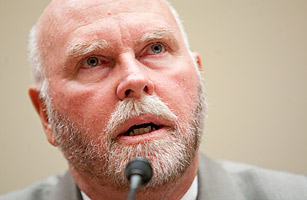
Highs: It's every scientist's dream — to create life in the lab. And Venter, along with his team at the J. Craig Venter Institute, did just that in May. Working with off-the-shelf chemicals that make up DNA, he painstakingly pieced together the genome of a bacterium known as Mycoplasma mycoides. Once inserted into a cell, the genes did their job and directed the bacterium's basic life functions of eating and reproducing. Venter is already working on generating genomes that can turn organic matter into biofuel, as well as preparing influenza strains that can shorten the time it takes to make a flu vaccine.
Lows: It took two years between constructing the genome and having it boot up in a cell and truly "live." Synthetic biology, as the field of man-made life is known, makes ethicists nervous as well, since the next step after copying an existing genome, as Venter did, is generating a new one — or new species — from scratch. Aware of the challenges that lie ahead, Venter commissioned a white paper that outlined responsible steps that synthetic biologists should follow to ensure the science is applied in ethically acceptable ways.
—Alice Park